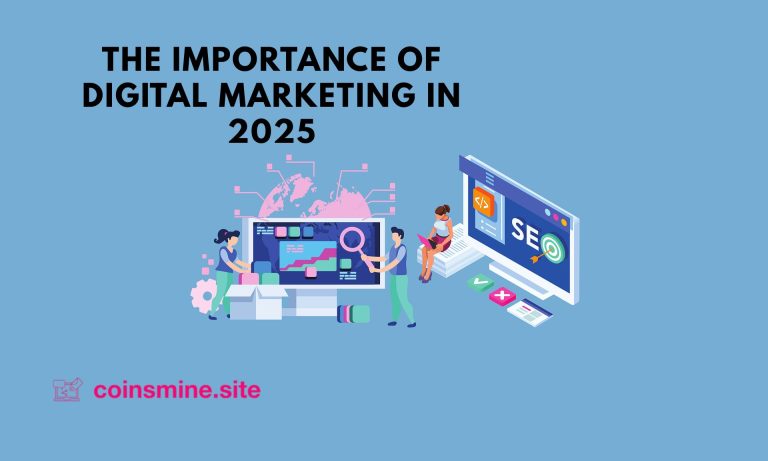The Importance of Digital Marketing in 2025: In 2025, digital marketing will have become crucial due to the ongoing changes in technology that are reshaping interactions between businesses and consumers. With most customers relying on online platforms for information, shopping, and communication, conventional marketing techniques are insufficient. Digital marketing provides a strong avenue to connect with specific audiences, enhance brand visibility, and boost conversions through economical, data-informed approaches.
With the rise of social media, SEO, tailored content, and mobile optimization, companies need to adopt digital tools to stay competitive and relevant. This piece examines the importance of digital marketing as a vital element of business success in the rapidly changing digital environment of today.
The Importance of Digital Marketing in 2025
In today’s rapidly evolving digital landscape, companies that do not adapt may find themselves at a disadvantage. Given that consumers are increasingly utilizing online platforms for purchasing, communication, and entertainment, digital marketing has emerged as a fundamental component of contemporary business strategy. Regardless of whether you are a startup, a small enterprise, or a large multinational company, maintaining a strong digital presence is vital for both survival and growth.
(1) Consumer Behavior Has Shifted Online.
One of the most important transformations in recent years is how consumers find, assess, and acquire products or services. Search engines, social media, online reviews, and e-commerce sites have emerged as essential elements of the buying process. By 2025, over 70% of consumers will initiate their shopping journey online, even if their final purchase occurs in-store.
Digital marketing enables brands to reach their audience in the spaces they already frequent. By utilizing search engine optimization (SEO), pay-per-click (PPC) advertising, and content marketing, businesses can interact with users throughout all stages of the sales funnel. Lacking a digital marketing strategy prevents companies from establishing connections with prospective customers in real-time.
(2) Cost-Effective and Scalable Marketing.
Conventional marketing methods such as television, print media, and radio can be costly and challenging to quantify. Small businesses can initiate an affordable campaign on platforms such as Facebook or Google Ads and observe measurable outcomes in just a few days.
Promotional avenues such as email, social media, and content generation enable companies to connect with thousands—if not millions—of individuals at a much lower cost compared to traditional approaches. Additionally, analytics tools offer valuable insights on the effectiveness of campaigns, simplifying the process of refining and enhancing efforts for the best return on investment (ROI).
(3) Advanced Targeting and Personalization.
Contemporary digital marketing platforms utilize artificial intelligence (AI) and data analysis to provide tailored content to users.
From customized email campaigns to interactive website content and tailored product suggestions, digital marketing allows companies to focus on particular audiences according to their behavior, demographics, interests, and geographic location. This level of precision in targeting enhances engagement, drives conversions, and reinforces customer loyalty.
(4) Rise of Mobile and Voice Search.
As mobile devices now represent more than 60% of worldwide internet traffic, digital strategies need to be tailored for mobile-first audiences. Responsive website design, quick-loading pages, and content that is friendly to mobile users are essential requirements in 2025.
Furthermore, voice search is transforming SEO strategies. As smart speakers and voice assistants such as Siri, Alexa, and Google Assistant become more prevalent, companies need to optimize for conversational phrases and natural language questions to maintain their visibility.
(5) Global Reach and 24/7 Presence.
In contrast to conventional business models, digital marketing eliminates geographical limitations. Even modest brands can connect with a worldwide audience through social media, online marketplaces, and content in multiple languages.
Your website and social media accounts are accessible at all times, allowing your business to attract leads, offer assistance, and close sales even during the night. The continual presence increases brand exposure and fosters customer trust.
(6) Data-Driven Decisions and Real-Time Insights.
Digital marketing offers unmatched access to data. Resources such as Google Analytics, Facebook Insights, and email marketing dashboards enable marketers to observe user behavior, track conversions, and evaluate ROI accurately.
This immediate feedback enables companies to make decisions based on data, adapt their strategies rapidly, and enhance campaign results—something that conventional marketing cannot achieve as swiftly or effectively.
Conclusion.
In 2025, digital marketing has shifted from being a choice to an essential requirement. Today’s consumers are well-connected, knowledgeable, and hold significant power. To maintain relevance, competitiveness, and profitability, businesses need to prioritize investments in digital platforms that enhance engagement, create brand recognition, and stimulate growth. By utilizing the most recent tools and strategies, companies can stay proactive and succeed in a world that is increasingly focused on digital interactions.



